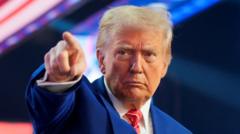Donald Trump, addressing a conservative audience, threatened to regain control of the Panama Canal unless fees imposed on U.S. vessels are reduced, igniting immediate backlash from Panama's government.
Trump’s Controversial Remarks Over Panama Canal Revive Sovereignty Debate

Trump’s Controversial Remarks Over Panama Canal Revive Sovereignty Debate
The President-elect's demands on Panama raise eyebrows and highlight tensions in U.S. foreign policy.
In a bold move that has reignited discussions surrounding U.S. foreign policy, President-elect Donald Trump made striking comments about the Panama Canal during a recent gathering of conservative activists. Speaking in Arizona in front of thousands at the Turning Point USA conference, Trump insisted that Panama should either decrease the exorbitant fees charged to American shipping and naval vessels or forfeit control of the canal back to the United States.
"The fees being charged by Panama are ridiculous and highly unfair," he stated, making it clear that this "complete rip-off" would not be tolerated once he takes office next month. The controversial remarks drew swift condemnation from Panama's President José Raúl Mulino, who emphasized his nation's sovereignty and independence in maintaining total control over the canal and its adjacent territories.
Trump's statements mark an unusual stance from an incoming U.S. leader, as he offered no clear explanation of how he would compel Panama to return territory held since sovereignty was progressively relinquished by the U.S. between 1977 and 1999. "We will demand that the Panama Canal be returned to us, in full, quickly and without question," Trump declared, labeling the canal a "vital national asset" for the United States.
The canal serves as a crucial transit route for nearly 14,000 ships each year, which include various commercial and military vessels. Trump's declaration also coincided with his criticisms directed toward Canada and Mexico regarding trade practices—underscoring a potential shift in the U.S.'s diplomatic stance under his administration set to begin on January 20.
While referencing local and international trade relations, Trump recounted his recent election win and reiterated familiar campaign talking points such as immigration, crime, and foreign trade. He also lightly touched upon other political controversies, humorously denying rumors suggesting a power swap with technology mogul Elon Musk.
The fallout from Trump's statements emphasizes the complexities of maintaining international diplomacy while navigating national interests, a discussion likely to gain momentum as his presidency commences.





















